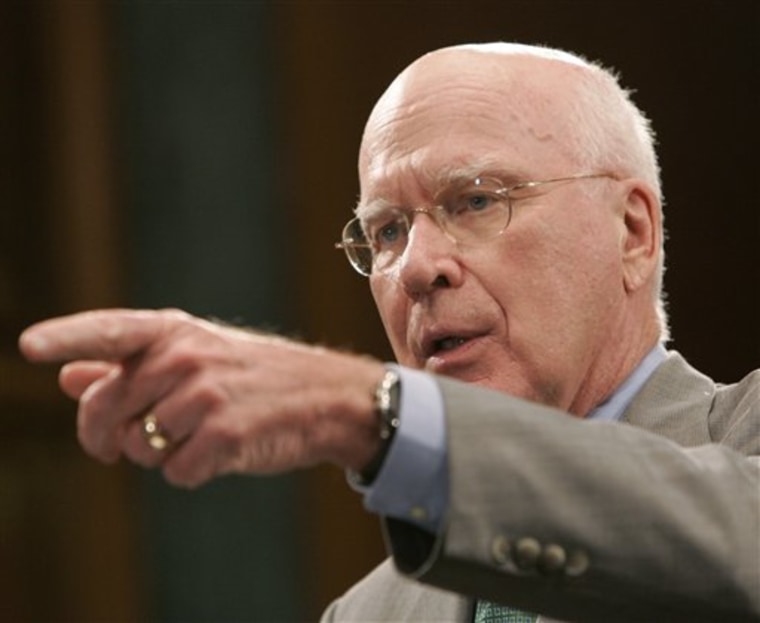A top Senate Democrat on Monday threatened to hold members of the Bush administration in contempt for not producing subpoenaed information about the legal justification for President Bush's secretive eavesdropping program.
"When the Senate comes back in the session, I'll bring it up before the committee," said Sen. Patrick Leahy, D-Vt. and chairman of the Senate Judiciary Committee. "I prefer cooperation to contempt. Right now, there's no question that they are in contempt of the valid order of the Congress."
Leahy's committee on June 27 subpoenaed the Justice Department, National Security Council and the offices of the president and vice president for documents relating to the National Security Agency's legal justification for the wiretapping program.
White House lawyer Fred Fielding, in a Monday letter to Leahy, said that the administration needed more time.
"A core set of highly sensitive national security and related documents we have so far identified are potentially subject to claims of executive privilege and that a more complete collection and review of all materials responsive to the subpoenas will require additional time," Fielding said.
Cheney office signals resistance
The Washington Post reported on its Web site Monday that Vice President Dick Cheney's office had acknowledged it had dozens of memos and orders related to the wiretapping program, including 43 separate authorizations from Bush and 10 legal memoranda from the Justice Department.
While Cheney's counsel, Shannen W. Coffin, said the documents "may be responsive" to the Senate committee's demands, he gave no indication that the vice president's office was likely to hand them over without a struggle, the Post reported.
Leahy said his committee had waited long enough.
"It has been almost two months since service of the subpoenas, three weeks since the time they asked for additional time. And still, we have nothing at all," Leahy said.
Leahy also questioned whether the Senate would again reauthorize laws that expand the government's authority to spy on foreigners without the subpoenaed information.
FISA re-approval threatened
Congress, before it left for its August recess, approved an update to the 1978 Foreign Intelligence Surveillance Act, allowing the government to eavesdrop on terror suspects overseas without first getting a court warrant.
The overhaul was the result of a recent Foreign Intelligence Surveillance Court ruling that banned eavesdropping on foreigners when their messages were routed though communications carriers based in the United States.
The provisions expire after six months, but the White House wants them made permanent.
"For Congress to legislate effectively in this area, it has to have full information about the executive branch's interpretations of FISA," Leahy said. "We cannot, and certainly, we should not legislate in the dark, where the administration hides behind a fictitious veil of secrecy."
The White House said it was not looking for a conflict with Congress over FISA.
"Extending and modernizing FISA is critical to our national security, and our intelligence professionals consider it imperative that we do not weaken the tools they feel are necessary to protect America's national security interests," White House spokesman Tony Fratto said.
U.S. attorney firings
Leahy also indicated that the committee would continue to seek recently resigned White House adviser Karl Rove's appearance on the U.S. attorney firings.
Fielding has said President Bush would invoke executive privilege to keep Rove from answering questions or submitting documents to Senate Judiciary Committee. The committee has been investigating whether the White House ordered the prosecutor firings in ways that might help Republicans in elections.
"I don't think he had a valid claim of executive privilege, because all the testimony has been it wasn't discussed with the president. If it wasn't discussed with the president, there's no executive privilege," Leahy said. "And they've just lost the other claim they could make that he's too important to the operation of the White House to be able to take time to testify. That's not going to be the case anymore."
